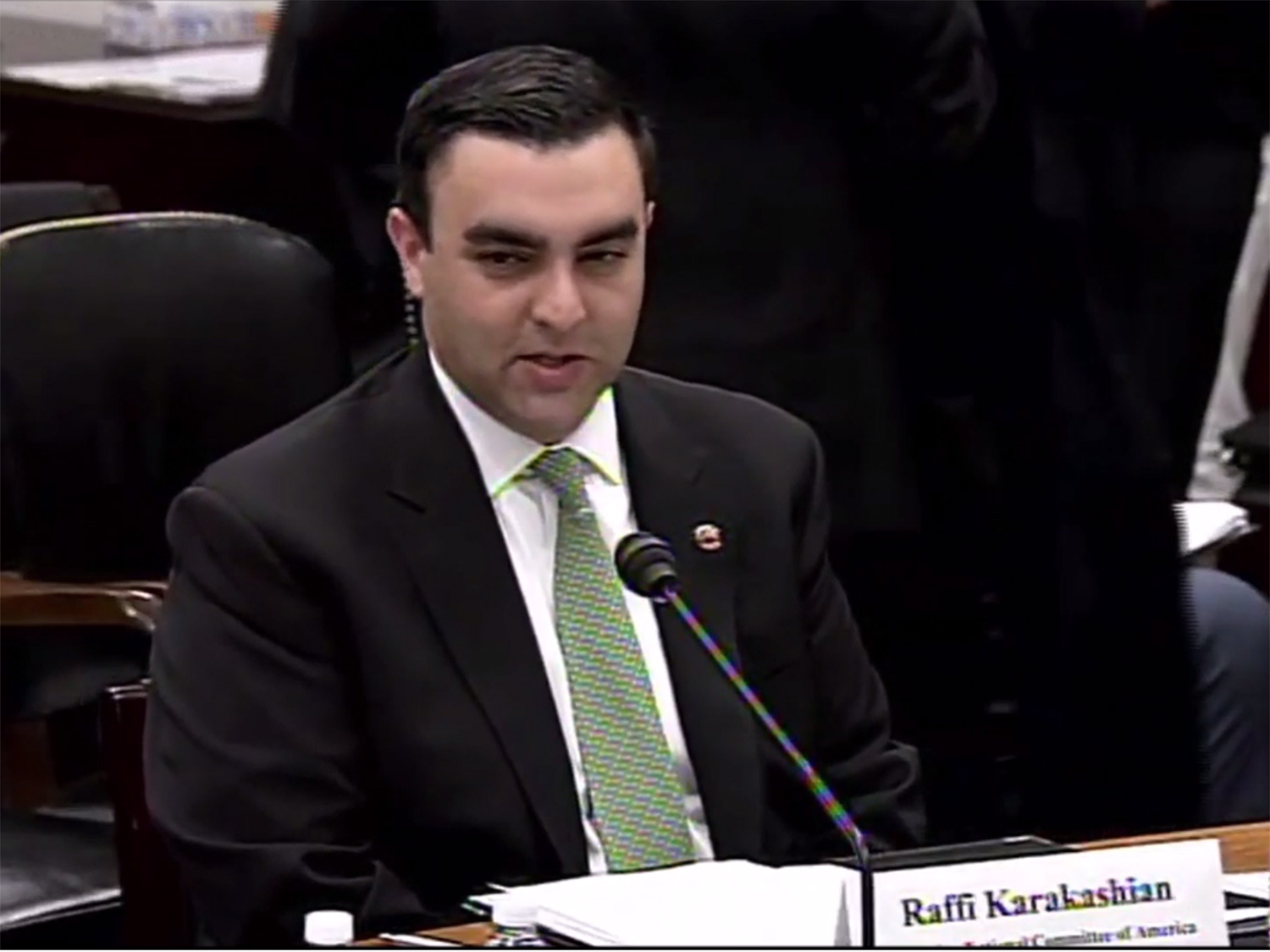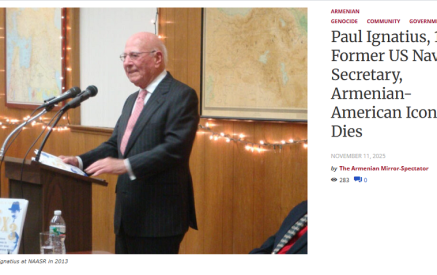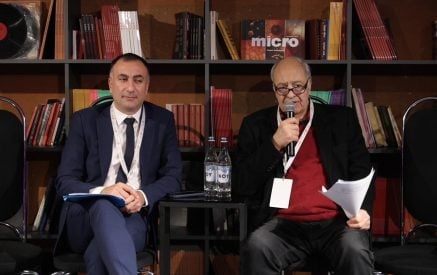During his remarks before the U.S. House panel responsible for foreign aid, Karakashian explained that the support of Congress for a series of funding priorities and policy-related provisions that advance U.S. national interests and promote core American values in the Caucasus region. These provisions include:
— $30 million in economic assistance to Armenia to enable Armenia’s aid-to-trade transition
— $10 million in military aid to Armenia to support Armenia’s peacekeeping programs
— $20 million in “safe haven” aid to help Armenia settle Syrian and other Middle East refugees
— $6 million in Artsakh aid for de-mining and rehabilitation services
— $4 million in Royce-Engel aid to strengthen the cease-fire by deploying gunfire locators
Others testifying before the influential House foreign aid panel were representatives of The Halo Trust, which continues its USAID supported Artsakh demining efforts, the Armenian Assembly of America, the American Hellenic Institute and a broad range of community, human rights, health, and humanitarian organizations. Among the last to testify was a representative from an Azerbaijani organization, often linked to the dictatorial Aliyev regime, whose entire testimony was a vitriolic attack on Armenia.
The full text of the ANCA’s written testimony is provided below.
#####
The Armenian American Community & U.S. Foreign Assistance Policy
For Fiscal Year 2020
presented by
Raffi Karakashian, Government Affairs Director
Armenian National Committee of America (ANCA)
for the
Subcommittee on State, Foreign Operations, and Related Programs
Committee on Appropriations
United States House of Representatives
In the aftermath of Armenia’s constitutional, political transition and recent free and fair elections, we want to share our special thanks with the Subcommittee for its longstanding leadership in fostering the bilateral friendship of our two nations, to voice our appreciation for the steady progress of Armenia’s aid-to-trade transition, and to seek your continued support for strengthening Armenia’s independence, securing a durable and democratic peace for Nagorno Karabakh (Artsakh), and sustaining Armenia as a regional safe haven for at-risk refugees.
Our specific requests are as follows:
1) Nagorno Karabakh: Complete De-Mining, Promote Peace, Help the Disabled
Since Fiscal Year 1998, direct U.S. aid to Nagorno Karabakh has represented a powerful investment in peace and an enduring expression of America’s leadership in supporting a negotiated and democratic resolution of outstanding security and status issues between Nagorno Karabakh and Azerbaijan.
American assistance has met pressing humanitarian needs, including clean water for families and mine-clearance across Nagorno Karabakh’s farmlands, towns, and villages. The HALO Trust, with the support of this Subcommittee, is close to declaring Nagorno Karabakh mine-free, but needs continued funds to complete its life-saving work.
In addition to de-mining, we urge this panel to support the operations of Nagorno Karabakh-based regional rehabilitation centers, like the Lady Cox Rehabilitation Center in Stepanakert, which serve children, adults, and seniors with physical and mental disabilities. We also urge the Subcommittee to engage with USAID regarding potential partnerships with groups such as World Vision and Teach for All.
We commend legislators for supporting the Royce-Engel peace proposals, which call for the placement of OSCE-monitored, advanced gunfire locator systems and sound-ranging equipment to determine the source of attacks along the line of contact.
Request: We ask the Subcommittee to appropriate no less than $6,000,000 in direct aid for Nagorno Karabakh, and no less than $4,000,000 for the deployment of gunfire locator systems along the line of contact.
Language:
Of the funds appropriated by this Act, not less than $6,000,000 shall be made available for assistance for Nagorno Karabakh.
The Committee recommends funding for Nagorno Karabakh-based regional rehabilitation centers to care for infants, children and adults with physical and cognitive disabilities.
The Committee recommends continued funding for, and the geographic expansion of, Nagorno Karabakh de-mining, ordnance clearance, and mine-safety programs.
In the interest of effective U.S. oversight of our aid programs, the Committee recommends, that the Department of State and USAID lift any official or unofficial restrictions on U.S. travel, communication, or contacts with Nagorno Karabakh government officials or civil society stakeholders.
The Committee recommends making available no less than $4,000,000 to deploy gunfire locators, as part of the Royce-Engel peace proposals.
2) Armenia: Support for Armenia’s Independence
Armenia – a Christian nation deeply rooted in Western democratic values – has, despite dual Turkish and Azerbaijani blockades, emerged an important regional ally and international partner for the United States on a broad array of complex challenges. The Armenian military has been among the highest per capita providers of peacekeepers to U.S.-led deployments, including those in Afghanistan, Iraq, Lebanon, Kosovo, and Mali. Increased U.S. assistance will facilitate the further growth of bilateral military cooperation (in the areas of peace-keeping, field hospitals, and capacity-building), while also promoting the continued expansion of U.S.-Armenia economic relations.
We commend the Subcommittee’s commitment to American Schools and Hospitals Abroad, which continues to provide vital support for the American University of Armenia and the Armenian American Wellness Center.
Request: We ask the Subcommittee to appropriate at least $30,000,000 in U.S. economic assistance and $10,000,000 in military assistance to Armenia, in order to further develop U.S.-Armenia economic relations and to expand the scope and depth of U.S.-Armenia military cooperation.
Language:
Of the funds appropriated by this Act, not less than $30,000,000 shall be made available for economic assistance to Armenia.
Of the funds appropriated by this Act, not less than $10,000,000 shall be made available for military assistance to Armenia.
3) Azerbaijan: Suspend U.S. military Aid
As the Subcommittee considers issues related to Azerbaijan, we draw your attention to how its government has, in recent years, failed three key Congressional tests of its commitment to peace:
a) The Aliyev government, in the wake of its April 2016 major military offensive, has obstructed the implementation of the bipartisan Royce-Engel accountability/peace proposals, which call on all parties to the Nagorno Karabakh conflict to agree to the withdrawal of snipers, heavy weapons, and new armaments, the addition of OSCE observers, and the deployment gunfire locator systems.
b) The Aliyev government has condemned the U.S.-Artsakh Travel and Communication Resolution (H.Res.697 during the 115th Congress), a constructive bipartisan measure that seeks simply to open up channels of dialogue and discourse toward a peaceful resolution of regional conflicts.
c) Azerbaijan remains a recipient of U.S. military aid despite acting contrary to the spirit and letter of Section 907 of the FREEDOM Support Act.
The Aliyev regime has rejected reasonable pathways to peace, choosing violence over the hard but necessary work of negotiations.
Request: We ask the Subcommittee to zero out U.S. military aid to Azerbaijan, including Foreign Military Financing and International Military Education and Training, until its government agrees to the Royce-Engel proposals, ceases its threats of renewed war, stops cross-border attacks into Armenia and Nagorno Karabakh, and agrees to the resolution of regional conflicts through peaceful means alone.
Language:
None of the funds appropriated by this Act may be made available for assistance to the armed forces or security services of Azerbaijan until such time as the President determines and reports to the Committees on Appropriations that Azerbaijan has stopped obstructing implementation of the Royce-Engel proposals, ceased its threats of violence, ended cross-border attacks into Armenia and Nagorno Karabakh, and agreed to the resolution of regional conflicts through peaceful means alone.
Add the following certification requirement to the President’s waiver authority under Section 907 of the FREEDOM Support Act:
In the last fiscal year, Azerbaijan has not taken hostile action, either through military force or incitement, including but not limited to threatening pronouncements by government officials toward Armenia or Nagorno Karabakh, and has both stated and demonstrated its commitment to pursuing a lasting peace with Armenia and Nagorno Karabakh through solely non-violent means.
4) Armenia: Sustain a Safe Haven for At-Risk Christians and other Middle East Refugees
Armenia, a small country with a per capita GDP of roughly $4,000 per year – has welcomed nearly 25,000 refugees from Syria, with only modest levels of U.S. and international relief and resettlement assistance.
Language:
The ANCA, as always, thanks you for your leadership and looks forward to working with the Subcommittee to strengthen the U.S.-Armenia alliance, promote regional stability, and advance American foreign policy and economic interests.

























































